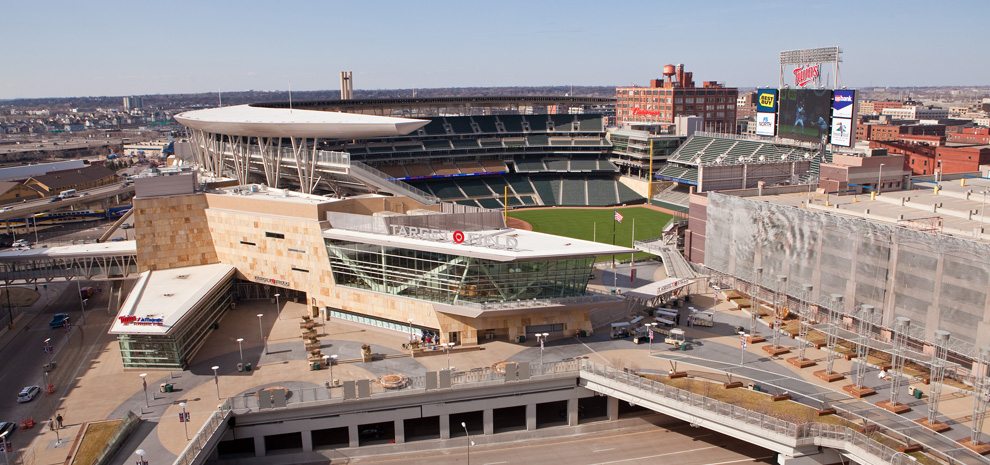- August 15, 2017
- Posted by: SportsV
- Categories: Home News, Industry News, News

The Minnesota Twins have received LEED Gold certification in Existing Buildings: Operations & Maintenance for their home ground, Target Field.
After being named the “Greenest Ballpark in America” and earning LEED (Leadership in Energy & Environmental Design) Silver certification for both New Construction and Existing Buildings: Operations & Maintenance, the Minnesota Twins have become the first professional sports franchise to also attain LEED Gold recertification for the operation and maintenance of their facility. LEED is the nation’s preeminent program for the design, construction and operation of high performance green buildings.
Earning LEED Gold certification for Existing Buildings: Operation & Maintenance is the third level of LEED certification for Target Field, becoming the first sports venue in the U.S. to earn three levels of LEED certification through Arc, the state-of-the-art digital platform that uses real-time data to help benchmark, measure and improve sustainability performance. Target Field and the Minnesota Twins earned LEED Silver for New Construction in 2010 and LEED Silver for Existing Buildings: Operation & Maintenance in 2011. Arc is the first-of-its-kind to track progress through a performance score enabling projects to make more informed decisions when it comes to sustainability.
Dave St. Peter, Twins President, said:
The Minnesota Twins organization believes our future success-both on and off the field-is built on a business model that embraces operational efficiency, environmental stewardship and social responsibility. We honor the power of sport by leading through example, and we will continue to use sport to inspire, build the best fan experience and cause no unnecessary harm, working with our fans, community, suppliers, partners and employees to have a positive influence in the world.
LEED Performance Path
The LEED Gold certification was earned at Target Field by recertifying via the U.S. Green Building Council’s (USGBC) new LEED Performance Path certification option. By utilising LEED Performance Path, Target Field becomes the first sports venue in the nation to recertify through this program using Arc. Target Field earned LEED points by taking advantage of credit from the previous certification efforts, as well as tracking and improving operations such as alternative transportation use, energy/water efficiency, waste diversion and recycling, air quality, and human experience.
Capturing and Re-using Rainwater
Through a custom-designed Rain Water Recycle System provided by Minneapolis-based Pentair, the Minnesota Twins have captured, purified and re-used more than 7,928,282 total gallons of rainwater, drastically reducing the use of municipal water at Target Field. The majority of the recycled rainwater was used to wash down the seating bowl attached to the main concourse.
Recycling and Converting Waste to Energy
Through aggressive recycling and waste-to-energy programs, the Twins have kept more than 8,256 tons of waste out of local landfills since 2011.
· 3,213 tons of waste have been recycled from Target Field
· 2,755 tons of trash have been sent to the Hennepin Energy Recovery Center
· 2,288 tons of organic materials have been composted and diverted from landfills
In 2017, the Twins will seek help from fans in increasing the amount of recycled organic materials, further reducing the amount of waste produced at Target Field.
Donating Unused Food to Local Charities
The Minnesota Twins and concession partner Delaware North Companies Sportservice donated more than ten tons of food to local charities last season. Through a partnership with Rock and Wrap It Up! Inc., representatives from Joseph’s Storehouse in Brooklyn Park boxed up all prepared but untouched meals at Target Field, donating the unused food from Target Field to local charities. Throughout the five-year partnership, the Twins have donated:
· 213,622 cased meats (hot dogs, brats, etc.)
· 34,488 hamburgers
· 16,599 chicken breasts
New Partnership with Eco-Products
After turning more than 300 tons of trash into fertile soil last year, the Minnesota Twins and Eco-Products plan to top that this year. With the help of fans, hundreds of thousands of beer cups, plates and nacho trays at Target Field were converted to compost last year. This year, the Minnesota Twins want to create even more compost. Last year, Target Field composted 300.89 tons of trash and recycled 464 tons. Organisers are working to beat those numbers this year. Target Field is adding new equipment, improving the sorting bins and providing more training for concession-stand workers.
Jase Miller, Manager of Ballpark Operations for the Minnesota Twins, said:
Our fans should be proud of all they’re doing to make Target Field the greenest ballpark in America. Together, we’ve kept thousands of tons of trash out of local landfills. That’s a huge win not just for Target Field, but for the whole community.
Eco-Products, based in Boulder, Co., supplies the compostable cups, plates, trays, utensils and straws at Target Field. Much of the packaging relies on a material called Ingeo™, a compostable resin made by a company called NatureWorks headquartered a short distance from Target Field in Minnetonka, MN. Eco-Products is the nation’s leading brand of single use foodservice packaging made from renewable and recycled resources.
Source: MLB.com
Image, courtesy: Populous

